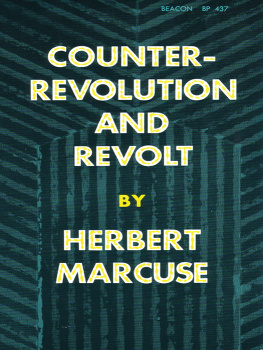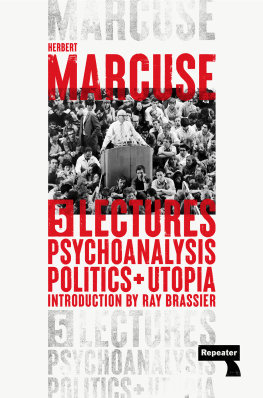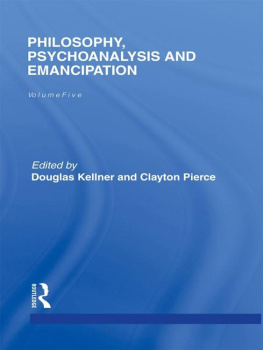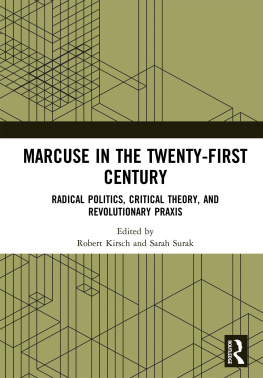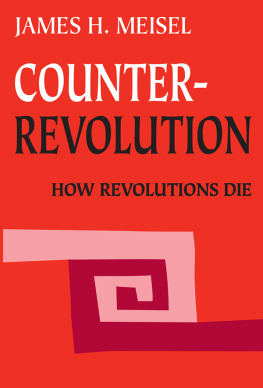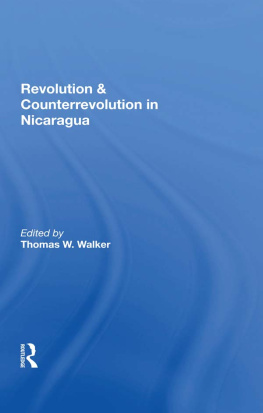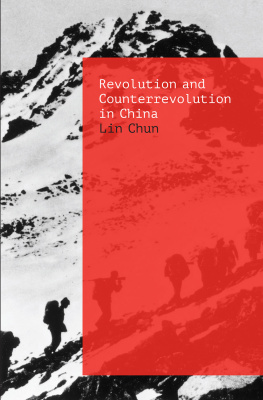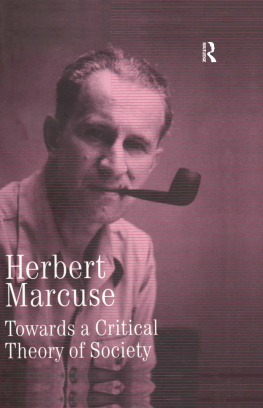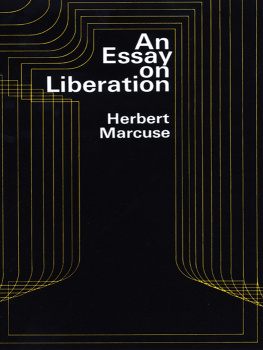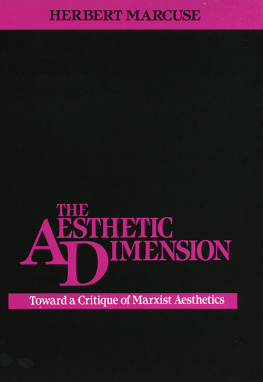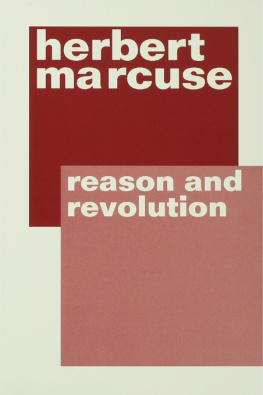ACKNOWLEDGMENTS
My friends Leo Lowenthal (University of California at Berkeley) and Arno J. Mayer (Princeton University) thoroughly read and commented on the manuscript. Intensive discussions with Andr Gorz helped me to clarify my views.
I did not show the manuscript to my indispensable friend, Barrington Moore, Jr., as I have always done in the past. He was engaged in writing his own new book. My wish is that his book be widely read. For me, it is a necessary correction of my work.
Much of the material in this book was first submitted in lectures delivered in 1970 at Princeton University and at the New School for Social Research in New York City. I gratefully acknowledge a grant from the Hartford Arts Foundation which allowed me to work out the ideas on art in .
My thanks to Arnold C. Tovell and to Beacon Press for many years of faithful and pleasant cooperation.
THE LEFT UNDER THE COUNTERREVOLUTION
I
The Western world has reached a new stage of development: now, the defense of the capitalist system requires the organization of counterrevolution at home and abroad. In its extreme manifestations, it practices the horrors of the Nazi regime. Wholesale massacres in Indochina, Indonesia, the Congo, Nigeria, Pakistan, and the Sudan are unleashed against everything which is called communist or which is in revolt against governments subservient to the imperialist countries. Cruel persecution prevails in the Latin American countries under fascist and military dictatorships. Torture has become a normal instrument of interrogation around the world. The agony of religious wars revives at the height of Western civilization, and a constant flow of arms from the rich countries to the poor helps to perpetuate the oppression of national and social liberation. Where the resistance of the poor has succumbed, students lead the fight against the soldateska and the police; by the hundreds, students are slaughtered, gassed, bombed, kept in jail. Three hundred of them chased and shot down on the streets of Mexico City opened the festival of the Olympics. In the United States, students are still in the forefront of radical protest: the killings at Jackson State and Kent State testify to their historical role. Black militants pay with their lives: Malcolm X, Martin Luther King, Fred Hampton, George Jackson. The new composition of the Supreme Court institutionalizes the progress of reaction. And the murder of the Kennedys shows that even Liberals are not safe if they appear as too liberal...
The counterrevolution is largely preventive and, in the Western world, altogether preventive. Here, there is no recent revolution to be undone, and there is none in the offing. And yet, fear of revolution which creates the common interest links the various stages and forms of the counterrevolution. It runs the whole gamut from parliamentary democracy via the police state to open dictatorship. Capitalism reorganizes itself to meet the threat of a revolution which would be the most radical of all historical revolutions. It would be the first truly world-historical revolution.
The fall of the capitalist superpower is likely to precipitate the collapse of the military dictatorships in the Third World which depend entirely on this superpower. They would be replaced, not by the rule of a national liberal bourgeoisie (which, in most of these countries, accepts neocolonial ties with the foreign power) but by a government of the liberation movements committed to introduce long overdue radical social and economic changes. The Chinese and Cuban revolutions would be able to go their own waysfreed from the suffocating blockade and the equally suffocating necessity of maintaining an ever more costly defensive machine. Could the Soviet world long remain immune, or for any length of time capable of containing this revolution?
Moreover, in the capitalist countries themselves, the revolution would be qualitatively different from its abortive precursors. This difference would vary in degree, according to the uneven development of capitalism. In its most advanced tendencies, this revolution could break the repressive continuum which today still ties socialist reconstruction competitively to capitalist progress. Without this dreadful competition, socialism could overcome the fetishism of the productive forces. It could gradually reduce the subordination of man to the instruments of his labor, direct production toward the elimination of alienated labor, while renouncing the wasteful and enslaving conveniences of the capitalist consumer society. No longer condemned to compulsive aggressiveness and repression in the struggle for existence, individuals would be able to create a technical and natural environment which would no longer perpetuate violence, ugliness, ignorance, and brutality.
Behind these familiar traits of a socialism yet to come is the idea of socialism itself as a qualitatively different totality. The socialist universe is also a moral and aesthetic universe; dialectical materialism contains idealism as an element of theory and practice. The prevalent material needs and satisfactions are shapedand controlledby the requirements of exploitation. Socialism must augment the quantity of goods and services in order to abolish all poverty, but at the same time, socialist production must change the quality of existencechange the needs and satisfactions themselves. Moral, psychological, aesthetic, intellectual faculties, which today, if developed at all, are relegated to a realm of culture separate from and above the material existence, would then become factors in the material production itself.
If this integral idea of socialism is now becoming a guide for theory and practice among the radical Left, it is the historical answer to the actual development of capitalism. The level of productivity which Marx projected for the construction of a socialist society has long since been attained in the technically most advanced capitalist countries, and precisely this achievement (the consumer society) serves to sustain capitalist production relations, to ensure popular support, and to discredit the rationale of socialism. Certainly, capitalism has not been and never will be able to bring its production relations into harmony with its technical capacity; mechanization which could progressively eliminate human labor power from the process of material production would eventually spell the end of the system. But capitalism can further raise the productivity of labor by enlarging the dependence of the underlying population. In fact, the equation: technical progress = growing social wealth (the rising GNP!) = extended servitude is the law of capitalist progress. Exploitation proclaims its justification in the constant augmentation of the world of commodities and servicesthe victims are overhead expenses, accidents on the road to the good life.
No wonder then, that where the capitalist technostructure still preserves a relatively high standard of living and a power structure virtually immune to popular control, the people are apathetic if not thoroughly hostile to socialism. In the United States, where the people include the vast majority of the blue collar working class, this hostility is directed against the Old as well as the New Left; in France and Italy, where the Marxist tradition of the labor movement is still alive, the Communist Party and trade unions command the allegiance of the larger part of the working class. Is this due only to the depressed living conditions of this class, or also to the Communist policy, with its democratic-parliamentary minimum program which promises a (relatively) peaceful transition to socialism? In any case, this policy suggests the prospect of considerable improvement for the working classes of their prevailing situationat the expense of reducing the prospect of liberation. Not only the commitment to the USSR but also the very principles of the sustained minimum-strategy lessen the difference between the established and the new society: socialism no longer appears as the definite negation of capitalism. Quite consistently, this policy rejectsand must rejectthe revolutionary strategy of the New Left which is tied to the concept of socialism as the break with the continuum of dependence, the break from the beginning: the emergence of self-determination as a principle of the reconstruction of society. But the radical goals as well as the radical strategy are confined to small minoritarian groups, middle class rather than proletarian in their compositions; while a large part of the working class has become a class of bourgeois society.

